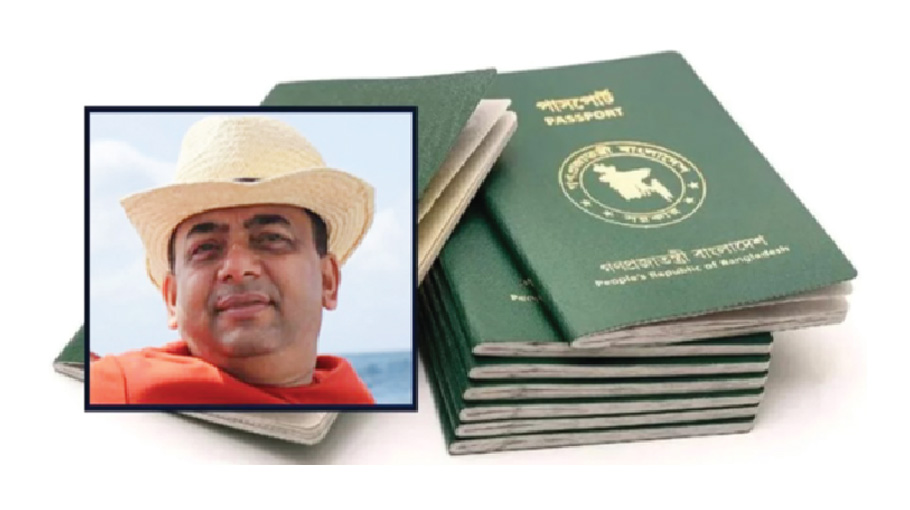Benazir uses 7 fake passports

The Anti-Corruption Commission (ACC) has identified some top officials of the Directorate of Passport and Immigration (DIP) who were allegedly involved in issuing seven fake passports to former Inspector General of Police (IGP) Benazir Ahmed.
The anti-graft watchdog came to know about the issuance of fake passports to the former police chief after it interrogated eight senior officials of the DIP at the ACC headquarters for several hours on Tuesday.
Preferring anonymity, a senior ACC official said that Benazir had obtained at least seven fake passports in collusion with some influential officials of the DIP and Home Ministry.
It is mentionable that DIP is a state-owned organisation under the Home Ministry. During the interrogation, junior DIP officials claimed that they had worked at the behest of their supervising officials.
But the four directors of the DIP, who were grilled by the ACC officials, tried to put blame on other top officials, including the then Director Generals (DG), and Additional DGs.
ACC officials are now planning to summon these high-ups of the DIP. They will summon these high officials through proper channel as many of these senior officials have already left the DIP and joined their respective workplaces. However, few of these officials have already went on retirement.
ACC will also interrogate former RAB officials in this regard and file another case against Benazir after the investigation is completed.
ACC team started interrogating eight officials of passport decorate to investigate the matter since the morning which ended in the afternoon. A team led by ACC deputy director Hafizul Islam grilled the officials.
He never uses official passports
8 passport officials quizzed
ACC to grill top DIP, RAB officials
This correspondent could not reach him over phone after the interrogation. The DIP officials include four directors, a deputy director, and two deputy directors. They were identified as Abdullah Al Mamun, Saidur Rahman, Munshi Muyeed Ekram, Abu Nayeem Masum, Suvash Chandra Roy, Azizul Haque, Mohsin Islam and Motaleb Hossain.
Sources said that Benazir concealed his police identity in his passports, identifying himself as a private service-holder. Consequently, he did not receive a blue official passport and, despite having the opportunity, he did not opt for a 'red passport' either.
When detected during renewal, the DIP blocked the passport and sent a letter to the RAB headquarters for scrutiny. However, he managed everything abusing power. Later, using that passport, he fled the country secretly after media outlets carried out reports on his massive corruption and
irregularities. Since the start of his career, Ex IGP Benazir did not take a special passport as a government employee in a bid to hide his crime.
ACC has found seven passports in the name of Benazir Ahmed. Some of these passport numbers are E0017616, AA1073252, BC0111070, BM0828141 and 800002095.
Benazir Ahmed amassed illegal wealth worth thousands of crores of taka through corruption.
Benazir committed unprecedented fraud in getting ordinary passports under the guise of a private employee.
It is learnt that Benazir applied for renewal of his old handwritten passport on 11 October 2010. For some mysterious reasons, instead of taking the blue official passport, he took an ordinary one. During this process, he hid his identity and introduced himself as a private employee in the application form.
A review of the documents reveals that the authority concerned issued a machine readable passport to him on 14 October 2010, with an expiry date of 13 October 2015. He applied for passport renewal again in 2014, before the expiry date, introducing himself as a private employee.
Sources said that during his tenure as the Commissioner of Dhaka Metropolitan Police, Benazir did not obtain an official passport. His second renewed passport was valid until 17 September 2019. Later, he submitted another application for passport renewal while serving as the Director General of RAB. Again, he applied for an ordinary passport, hiding his identity. During this time, the truth was discovered.
According to sources, upon detecting fraud in the application form, DIP wrote to the RAB headquarters seeking an explanation for the acceptance of Benazir's ordinary passport on dubious grounds.
In response, a letter was sent from the RAB headquarters supporting Benazir's objective. The then Additional Director General (Administration) of RAB Headquarters Abdul Jalil Mondal immediately wrote a letter requesting the renewal of Benazir's passport. DIP was subsequently forced to issue a passport to Benazir within 24 hours.
In 2020, Benazir Ahmed became the 30th IGP and was entitled to a diplomatic passport. But he did not take the prestigious red passport. Instead, he applied for an ordinary passport as a private employee. With the introduction of state-of-the-art e-passports, complications arose with his application.
Sources said Benazir resorted to unprecedented fraud this time too. He claimed that he fell ill and requested the DIP mobile unit to visit his house. Officials secretly completed the formalities, including photographing and fingerprinting. His application was submitted on 4 March 2020, and a 10-year e-passport was issued in his name on 1 June.
Concerns were raised about major irregularities in Benazir's passport issuance. Government employees are typically issued passports valid for up to 5 years, but Benazir received a 10-year passport. Additionally, issuing a general passport for an IGP without reporting to higher authorities was against protocol.
DIP officials said government employees can opt for an ordinary passport instead of an official one, but this requires approval from the relevant ministry or department. The profession must be listed as "government employee," with no option to mention a private job or other profession.
A passport official, on condition of anonymity, said it was unusual for Benazir not to obtain a diplomatic passport despite being the IGP. There could be various reasons for this. Perhaps he has already obtained citizenship in a different country, which prevented him from accepting the red passport. Additionally, he might have considered it safer to have a normal passport to keep his options open for leaving the country at any time.



